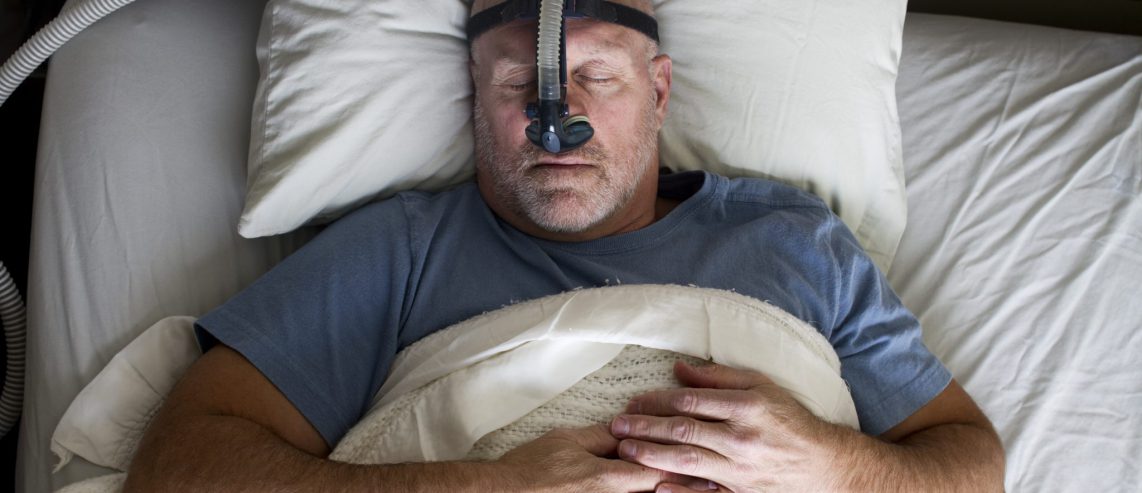A continuous positive airway pressure machine, or CPAP, is a medical device used to treat someone with sleep apnea. If you have sleep apnea, or if your doctor suspects you do, a CPAP machine may help you breathe and sleep better at night. Here’s what you need to know about CPAPs and sleep apnea.
What Is Sleep Apnea?
Sleep apnea is a common sleep-related breathing disorder and medical condition.
About 30 million people in the U.S. have sleep apnea, according to the American Medical Association. But only six million people have a sleep apnea diagnosis. That means many people have sleep apnea and aren’t getting the help they need.
The most common type of sleep apnea is obstructive sleep apnea, or OSA. This is when your airway becomes partially or fully blocked during sleep, often several times during the night.
Signs and symptoms of sleep apnea
Loud and excessive snoring is one of the main signs of OSA. Other common signs and symptoms include:
- Choking or gasping during sleep.
- Dry mouth after you wake up.
- Feeling tired, fatigued, or sleepy during the day.
- Headaches in the morning that last several hours.
- Not feeling well rested when you wake up.
Many times, someone you sleep with may notice that you snore or often stop and start breathing during sleep. If your partner says something like this to you, don’t ignore it or brush it off.
Some people may have mild sleep apnea symptoms. If you are one of them, your doctor may first recommend lifestyle changes, like losing weight or quitting smoking.
You can also try a CPAP machine, even if your sleep apnea is mild. The American Thoracic Society reports that even people with mild sleep apnea symptoms can benefit from using one.
Complications of Sleep Apnea
Left untreated, OSA can lead to serious health problems. These include:
- Cardiovascular issues, including arrhythmias, or irregular heartbeats, heart disease, heart failure, and stroke.
- Depression.
- Diabetes.
- Hypertension, or high blood pressure.
Untreated sleep apnea is also linked to drowsy driving and a risk of motor vehicle accidents, according to the Centers for Disease Control and Prevention.
Causes and Risks for Sleep Apnea
Both male and females across age groups can develop OSA. Many times, there are several factors that can cause or lead to sleep apnea. According to the National Library of Medicine, the most common factors that increase your risk for sleep apnea include:
- Obesity
- Male gender
- Older age
Other risk factors include:
- Being Asian, Black, or Hispanic.
- Drinking alcohol.
- Family history of sleep apnea.
- Medical conditions. These include atrial fibrillation, diabetes, congestive heart failure, Down Syndrome, hypothyroidism, metabolic syndrome, stroke, or spinal cord injury.
- Pregnancy.
- Sleeping on your back.
- Smoking.
- Upper airway structural problems, such as enlarged tonsils or jaw problems.
- Using sedatives or hypnotics.
Never Miss a Beat!
Subscribe to Our HealthBeat Newsletter!
Thank you for subscribing!
You can now select the specific newsletters you'd like to receive.
You are already subscribed.
Subscribe to more newsletters in our email preference center.
Sorry, an error occurred. Please try again later.
Get Healthy Tips Sent to Your Phone!
Do I Need a CPAP Machine?
CPAP machines are used to treat and manage OSA and other breathing disorders. To find out whether you have OSA, you will need to do a sleep study. Polysomnogram is the medical term for this test to diagnose sleep apnea.
You may need to go to a sleep clinic to do your sleep study. If you qualify, your doctor may order a small, portable device you can use at home to test for sleep apnea. The American Academy of Sleep Medicine has strict guidelines on who qualifies for a home sleep apnea test, or HSAT.
The results from the sleep study help your doctor decide whether a CPAP will help you and what type. If you do have sleep apnea, the study also tells the doctor what pressure settings to use to help you breathe better at night.
How Does a CPAP Work?
A CPAP machine uses mild pressurized air to help keep your airways open while you sleep. It has several parts:
- A mask or mouthpiece that fits over your nose or your nose and mouth.
- A band or straps to keep the mask in place.
- A small tabletop box that plugs into a wall outlet. This contains the CPAP’s motor, which creates and pumps pressurized air.
- A tube connecting the mask to the motor box.
For a CPAP to treat and manage your sleep apnea, you need to wear it each time you go to sleep and during naps. You also have to use it while traveling and on vacation. Machines come with a carrying case so you can bring it with you.
Air pressure is measured in centimeters of water, or cm H2O. Your doctor will decide which pressure setting works best for you.
The device also relays information back to your doctor. It tells them how often you use it, if the mask is leaking air, and if your sleep apnea is continuing.
Your setting may change over time. That’s why it’s important to see your doctor for follow-up visits.
What’s It Like to Wear a CPAP?
You may wonder what it feels like to wear a CPAP machine. It can take some time to get used to wearing a CPAP machine.
Some people may have irritation to their face or head from the mask or strap. You may need to try different masks or mouthpieces to find one that’s comfortable for you.
Benefits of CPAPs
Some people may feel better right away in how they sleep the first night or feel the next day. Short- and long-term health benefits of wearing a CPAP include:
- Better sleep quality.
- Getting rid of or reducing snoring.
- Less daytime sleepiness and fatigue.
- Lowering your risk for heart disease and stroke.
- Mental health benefits, including reducing depression and improving memory and other cognitive functions.
- Preventing or controlling high blood pressure.
CPAP Machine Side Effects
While CPAP machines provide important sleep and health benefits, some people may experience side effects. Common side effects of CPAPs include:
- Congestion.
- Dry mouth.
- Nosebleeds.
- Runny nose.
Tell your doctor about any CPAP side effects. They can help find ways to reduce or manage them.
In some cases, CPAPs may cause bloating and stomach discomfort or pain. If these happen, stop using your CPAP machine and call your doctor right away.
Why You Should Talk To Your Doctor About Sleep Issues?
All too often, people have sleep issues but don’t think it’s important enough to tell their doctor. But your sleep health affects your overall health and well-being in many ways.
There are other sleep issues (besides sleep apnea) that can affect your health. These include insomnia, snoring, restless leg syndrome, and narcolepsy.
If you have problems sleeping, talk to your doctor. They can help figure out what’s causing your sleep issues. They can recommend lifestyle changes or get you on a treatment plan to better sleep and better health.
Sources
CPAP. National Institutes of Health. Link.
What Are The Different Types of CPAP Machines. Sleep Foundation. Link.
American Academy of Sleep Medicine. AASM Releases Position Statement on Home Sleep Apnea Testing. Link.
Sleep and Chronic Disease. Centers for Disease Control and Prevention. Link.
Drowsy Driving: Asleep at the Wheel. Centers for Disease Control and Prevention. Link.
Key Sleep Disorders. Centers for Disease Control and Prevention. Link.
Sleep Apnea: Causes and Risk Factors. National Institutes of Health. Link.
What Doctors Wish Patients Knew About Sleep Apnea. American Medical Association. Link.
Obstructive Sleep Apnea. StatPearls. National Library of Medicine. Link.
Patients with Mild Sleep Apnea Benefit from CPAP Therapy. American Thoracic Society. Link.
About UPMC
Headquartered in Pittsburgh, UPMC is a world-renowned health care provider and insurer. We operate 40 hospitals and 800 doctors’ offices and outpatient centers, with locations throughout Pennsylvania, Maryland, New York, West Virginia, and internationally. We employ 4,900 physicians, and we are leaders in clinical care, groundbreaking research, and treatment breakthroughs. U.S. News & World Report consistently ranks UPMC Presbyterian Shadyside as one of the nation’s best hospitals in many specialties and ranks UPMC Children’s Hospital of Pittsburgh on its Honor Roll of America’s Best Children’s Hospitals. We are dedicated to providing Life Changing Medicine to our communities.

